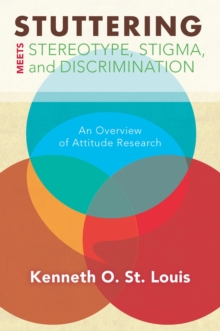
Stuttering Meets Sterotype, Stigma, and Discrimination : An Overview of Attitude Research PDF
by St. Louis Kenneth O. St. Louis
Part of the WVU Books series
Please note: eBooks can only be purchased with a UK issued credit card and all our eBooks (ePub and PDF) are DRM protected.
Description
More than a century of research has sought to identify the causes of stut-tering, describe its nature, and enhance its clinical treatment. By contrast, studies directly focused upon public and professional attitudes toward stuttering began in the 1970s. Recent work has taken this research to new levels, including the development of standard attitude measures; ad-dressing the widely reported phenomena of teasing, bullying, and dis-crimination against people who stutter; and attempting to change public opinion toward stuttering to more accepting and sensitive levels.
Stuttering Meets Stereotype, Stigma, and Discrimination: An Overview of Attitude Research is the only reference work to date devoted entirely to the topic of stuttering attitudes. It features comprehensive review chapters by St. Louis, Boyle and Blood, Gabel, Langevin, and Abdalla; an annotated bibliography by Hughes; and experimental studies by other seasoned and new researchers. The book leads the reader through a maze of research efforts, emerging with a clear understanding of the important issues involved and ideas of where to go next. Importantly, the evidence base for stuttering attitude research extends beyond research in this fluency disorder to such areas as mental illness, obesity, and race. Thus, although of interest primarily to those who work, interact, or otherwise deal with stuttering, the book has potential for increasing understanding, ameliorating negative attitudes, and informing research on any of a host of other stigmatized conditions.
Stuttering Meets Stereotype, Stigma, and Discrimination: An Overview of Attitude Research is the only reference work to date devoted entirely to the topic of stuttering attitudes. It features comprehensive review chapters by St. Louis, Boyle and Blood, Gabel, Langevin, and Abdalla; an annotated bibliography by Hughes; and experimental studies by other seasoned and new researchers. The book leads the reader through a maze of research efforts, emerging with a clear understanding of the important issues involved and ideas of where to go next. Importantly, the evidence base for stuttering attitude research extends beyond research in this fluency disorder to such areas as mental illness, obesity, and race. Thus, although of interest primarily to those who work, interact, or otherwise deal with stuttering, the book has potential for increasing understanding, ameliorating negative attitudes, and informing research on any of a host of other stigmatized conditions.
Information
-
Download - Immediately Available
- Format:PDF
- Pages:384 pages
- Publisher:West Virginia University Press
- Publication Date:01/03/2015
- Category:
- ISBN:9781940425382
Other Formats
- EPUB from £54.87
Information
-
Download - Immediately Available
- Format:PDF
- Pages:384 pages
- Publisher:West Virginia University Press
- Publication Date:01/03/2015
- Category:
- ISBN:9781940425382








